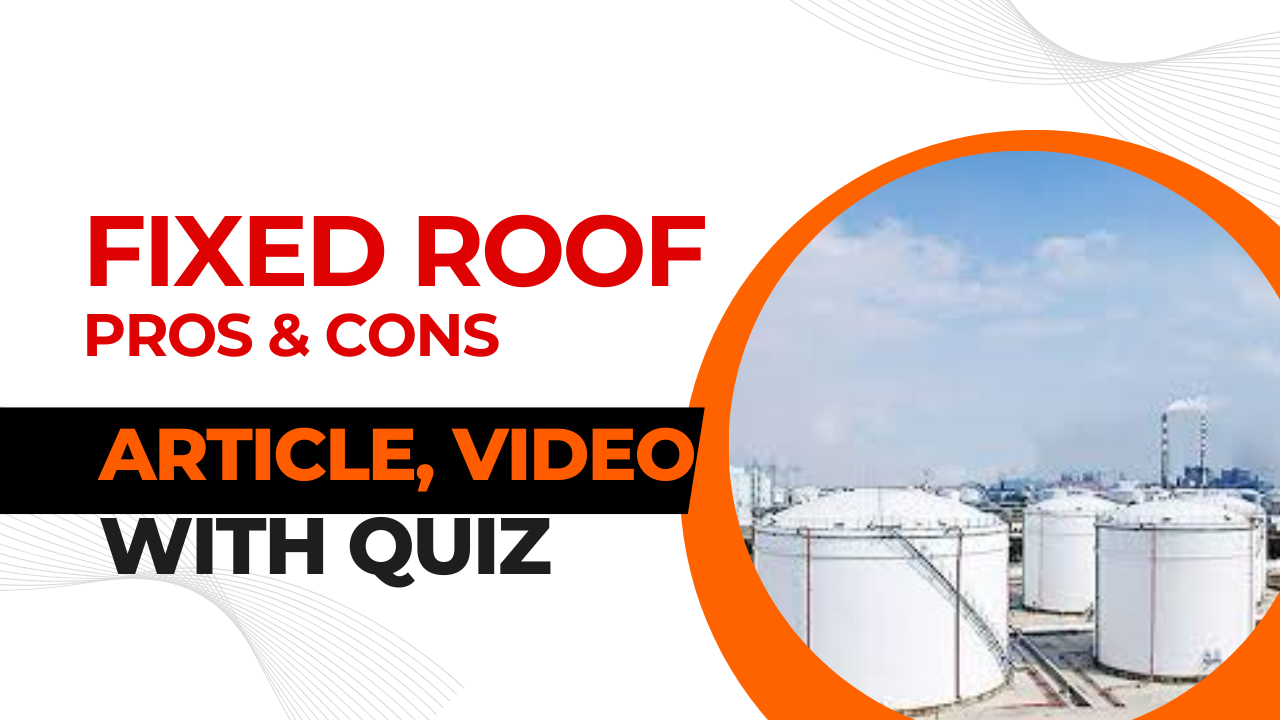Introduction
Fixed-roof tanks are a cornerstone of industrial storage, providing a secure and efficient means of storing various liquids, including crude oil, chemicals, and petroleum products. In this comprehensive guide, we’ll delve into the design considerations, benefits, and crucial maintenance practices associated with fixed-roof tanks.
Table of Contents
Don’t miss the Complete Course on Piping Engineering: Check Now
By EPCLand.com
Understanding Fixed-Roof Tanks
Fixed-roof tanks, as the name suggests, feature a solid, non-moving roof structure that is permanently attached to the tank’s shell. This design distinguishes them from floating-roof tanks, which have a roof that floats on the surface of the stored liquid.
Design and Components
Fixed-roof tanks consist of several key components:
- Shell: The cylindrical or rectangular container that holds the stored liquid.
- Roof: The fixed cover that shields the contents from external elements.
- Roof Supports: Structural elements that provide stability to the roof.
- Venting System: Ensures proper pressure control and prevents vacuum buildup.
- Manholes: Allow access for maintenance and inspection.
- Nozzles and Connections: Enable filling, draining, and monitoring.
Advantages of Fixed-Roof Tanks
Fixed-roof tanks offer several advantages that make them a popular choice for various industries:
1. Cost-Efficiency
Fixed-roof tanks are generally more cost-effective to construct and maintain compared to floating-roof tanks. Their simpler design and reduced components contribute to lower overall costs.
2. Vapor Control
The fixed roof provides an effective barrier against vapor emissions. This is particularly important for tanks storing volatile liquids, as it minimizes emissions and reduces environmental impact.
3. Reduced Maintenance Complexity
With fewer moving parts, fixed-roof tanks tend to require less maintenance and have a longer service life. This translates to lower maintenance costs over time.
4. Suitable for Stable Liquids
Fixed-roof tanks are ideal for storing stable liquids that do not undergo significant volume changes due to temperature fluctuations. Their design ensures structural integrity under varying conditions.
Maintenance of Fixed-Roof Tanks
Proper maintenance is essential to ensure the continued functionality and safety of fixed-roof tanks. Key maintenance practices include:
Regular Inspection
Scheduled inspections for signs of corrosion, leaks, and structural issues are vital. Addressing problems early prevents larger, more costly issues down the line.
Roof Cleaning
Remove debris and accumulated materials from the roof’s surface to prevent structural stress and deterioration.
Painting and Coating
Applying protective coatings and paints helps prevent corrosion and extends the tank’s lifespan.
Pressure Testing
Periodic pressure testing ensures the tank’s integrity, identifying potential weaknesses that could lead to leaks or other failures.
Emergency Preparedness
Develop and practice emergency response plans to manage potential spills, leaks, or other incidents effectively.
FAQs
Q1: What is a fixed-roof tank? A1: A fixed-roof tank is a storage container with a permanently attached non-moving roof, used to store liquids in industries such as oil, chemical, and petroleum.
Q2: How do fixed-roof tanks differ from floating-roof tanks? A2: Fixed-roof tanks have a solid, stationary roof, while floating-roof tanks have a roof that floats on the surface of the stored liquid.
Q3: What are the benefits of fixed-roof tanks? A3: Fixed-roof tanks are cost-efficient, provide effective vapor control, require less maintenance, and are suitable for stable liquids.
Q4: What maintenance practices are essential for fixed-roof tanks? A4: Regular inspection, roof cleaning, painting/coating, pressure testing, and emergency preparedness are crucial maintenance practices.
Q5: Which industries commonly use fixed-roof tanks? A5: Fixed-roof tanks are prevalent in industries such as oil and gas, petrochemicals, chemicals, and water treatment.
Conclusion
Fixed-roof tanks play a pivotal role in industrial storage, offering economic advantages, reliable vapor control, and durability. Understanding their design principles, benefits, and maintenance requirements is essential for industries that rely on effective storage solutions. By adhering to best practices in maintenance and safety, companies can ensure the long-term functionality and efficiency of fixed-roof tanks, contributing to the smooth operation of their operations.
Recommended courses (Published on EPCLand)
- Basics of Piping Engineering
- Piping Layout Engineering
- Piping Material Engineering
- Piping Stress Analysis
- Complete Course on Piping Engineering
- Material Requisitions
- Piping Material Specifications
- Valve Material Specifications
Don’t miss the published articles on following:
Related Video
Attempt Quiz
Question 1:
What are Fixed-Roof Tanks primarily used for?
Explanation: Fixed-Roof Tanks are primarily used for storing liquid chemicals, petroleum products, and other similar substances in industrial applications.
Question 2:
What is the purpose of a fixed roof on a storage tank?
Explanation: The purpose of a fixed roof on a storage tank is to prevent product contamination and evaporation, helping to maintain the quality and quantity of the stored material.
Question 3:
Which of the following is a disadvantage of fixed-roof tanks?
Explanation: One disadvantage of fixed-roof tanks is the increased maintenance costs associated with the need for regular inspections, cleaning, and potential repairs.
Question 4:
Which type of roof structure is commonly used in fixed-roof tanks?
Explanation: Conical roofs are commonly used in fixed-roof tanks. These roofs have a sloped, cone-like shape that allows rainwater and other materials to drain off easily.
Question 5:
What safety feature is typically included in fixed-roof tanks to prevent overpressure?
Explanation: A pressure relief valve is typically included in fixed-roof tanks to prevent overpressure by releasing excess pressure to the atmosphere, ensuring the safety of the tank and its contents.


